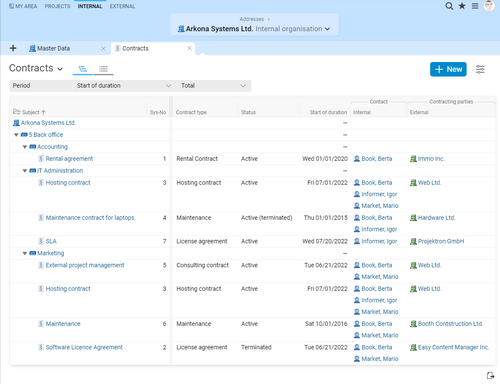04/13/2022 - Articles
Digital contract management: How to keep an eye on contract costs and deadlines
Hand on heart: Have you ever missed a cancellation deadline? What can easily happen privately with a cell phone contract sometimes causes considerable damage in the professional environment. Employees in companies have to keep track of a lot of different contracts, for example service agreements, rental agreements, leasing agreements, cooperation agreements, maintenance agreements, purchase agreements or support agreements. Each contract has individual terms, conditions and periods of notice. In addition, different people within the company are often responsible for concluding the contract. This article explains why digital contract management has become indispensable and how you can manage your contracts efficiently and effectively.
What is contract management?
Contract management is the systematic recording, administration and analysis of all contractual obligations of an organization with its service providers. It provides an overview of contract management with regard to
- Contract status (active or terminated),
- terms,
- documents,
- notice periods and
- costs as part of contract controlling
This means that contract management is much more than just document management. Contract management primarily means the systematic filing of contract documents so that they can be retrieved more easily at a later date. This is merely the basis for structured contract management.

Definition Contract Management
Contract management encompasses not only contract administration but also contract processing, contract analysis and contract controlling. It makes contract data available for monitoring and influencing business processes.
Since contract management deals with all the steps in the contract lifecycle, it is also referred to as "contract lifecycle management" (CLM). The contract lifecycle includes many phases, from the initiation of a contract to its creation and negotiation, review, various approval processes, signing, and fulfillment, all the way to legally compliant and audit-proof archiving.
Why is contract management important?
Have you also been confronted with questions like the following by superiors or colleagues?
- Where can you find the e-mail correspondence and contact history that resulted in this draft contract?
- Which employee in which department was responsible for negotiating the terms of the contract in a specific case?
- To which purchase order with which purchase order number does this contract document refer?
- Hasn't this contract already been terminated?
- By when do we have to cancel this contract to avoid another billing period?
- Is this invoice received justified?
- Where are the follow-on contracts to this contract filed?
We all know the still most common digital tool for contract management: Excel. One tries to create an Excel list of the contracts with all modalities, which is already a first step towards a better overview. At best, this also gives you an overview of costs. However, an Excel list cannot be called a contract management system. A contract list or table does provide an overview of which contracts have been concluded, which ongoing costs are incurred and who is responsible for which contract, but this is often the end of its possibilities.
What characterizes contract management?
In most companies, contract management is divided into contract administration and contract control.
Contract administration
Contract administration includes the following aspects of contract work:
- proper archiving of all documents
- structured organization that enables all parties involved to work with the contracts
- regular checks of contract deadlines
- Digitization of analog contracts and documents to achieve a paperless office.
Contract control
Contract controlling is concerned with the analysis and evaluation of the contracts organized in contract management. Those responsible for contract controlling ensure that...
- contract data is evaluated and the appropriate conclusions are drawn.
- contract risks are identified and managed.
- contract obligations such as payments and services are fulfilled.
A typical work process could, for example, consist of identifying a contract that is “useless” or risky for the company in the contract controlling process. The contract administration then takes over the termination and communicates this information to all parties involved.
12 reasons: This is why digital contract management is indispensable
Dedicated contract management software supports its users by automatically reminding them of review and termination deadlines and minimizing administrative work at all stages of the contract lifecycle. As a result, users no longer miss termination deadlines and are regularly reminded to review existing contractual relationships. But that's not all: good contract management software supports all steps and processes in the contract lifecycle. For the following twelve reasons, you should definitely not do without a contract management system:

1. search and find
Contracts are stored in a structured manner and can be filtered and searched according to various criteria, metadata or keywords. Keyworded documents and documents digitized with OCR recognition can be found via free and full text search and their content can be searched for terms and phrases.

2. digitization of analog documents
During contract entry, a document system also stores scans of analog contract documents in a structured manner in a digital contract file. In addition, a reference to the physical storage location is possible (e.g., file folder 2021/03, locker 5). This allows you to structure your analog document storage at the same time

3. automatic monitoring of deadlines and time limits
The software records all relevant deadlines and reminds responsible parties in good time via e-mail notification or an automatically created resubmission. Even after contract termination, all information is retained in the contract management software, providing the opportunity to analyze past contractual relationships and fulfill retention periods.

4. audit-proof filing
Legislation stipulates that all documents that are relevant for taxation must be archived in compliance with GoBD. This also includes incoming and outgoing invoices, which a contract management system links to the associated contracts and archives electronically. It thus supports your employees in working in a GoBD-compliant manner.

5. contract preparation
The functional scope of contract management software also includes the simple generation of contracts and other documents according to definable contract templates.

6. version management
Thanks to automatic versioning, changes in contract documents can be tracked in detail and older processing statuses can be reconstructed. Duplicates are avoided and editors always have access to the current version.

7. task management
You define who is responsible for which processing step on each document. This ensures that no document or contract-related task is lost in the scramble for authority and the shifting of responsibilities.

8. workflow management
Thanks to individually defined workflows, you can seamlessly integrate contracts and documents into work processes and ensure that each contract document goes through all the necessary processing steps. In this way, you accelerate workflows in your team and project work.

9. compliance with release and approval processes
Standardize and automate your approval processes by defining roles and responsibilities and creating workflows.

10. DSGVO-compliant handling of personal data
Information security and data protection are particularly important in the context of document management. In the software, you define who can read, delete or update which directories, files or documents.

11. contract controlling
The contract management system's reporting and analysis tools support all contract controlling tasks, such as risk monitoring, contract performance, and spend analysis. You can use this information for your liquidity planning.

12. risk management
In accordance with the German Law on Control and Transparency in Business (KonTraG), statements on risks and the risk structure of a company must be documented. A contract management system manages supplier and customer risks in the four phases of identifying, assessing, controlling and monitoring risks.
Use Case: Contract management for company cell phones
At Projektron, we currently have 23 ongoing cell phone contracts for our company cell phones. This can easily lead to missed cancellation deadlines and thus to unnecessary costs. In the past, it happened that contracts had been cancelled long ago, but invoices received by mistake were still ordered to be paid by the processor. Only later did an audit reveal that the equipment mentioned in the invoices was no longer being used at all.
To avoid such costly errors, we recorded the mobile phone contracts individually per phone number in Projektron BCS in addition to the framework contract. The structured filing in the contract management system enables us to:
- Invoice verification, as the monthly costs are stored in the system.
- Subsidization of cell phones
- Rate optimization (rate adjustment is based on the usage behavior of individual users)
- Overview of termination dates such as next possible end of contract or next possible termination date
Via e-mail BCS reminds in a self-definable period before each next possible cancellation date or the approaching end of the contract. We also store SIM and ultra cards as contract objects and link the objects to the cell phones ordered on them and created in BCS inventory management. In this way, the respective SIM cards can be quickly located. If, for example, one employee uses the SIM, another the ultracard, and a third the cell phone, we can track this in detail and maintain an overview. In this way, we can in good time
- switch the contract from a SUB rate with the option of ordering a cell phone to a cheaper SIM-only rate without the option of ordering a cell phone if no cell phone is needed at the time,
- find the contracts on which we can order a cell phone,
- see when we can or have to cancel a contract and
- see which contracts have already been cancelled.
For each cell phone we create a resource in BCS, for each invoice we create a purchase contract. By linking the purchase contract to the resource, we can quickly find all the required information and the associated documents in the file repository in the event of a warranty claim.
Digital contract management requires the right tool
Good contract management software organizes contract inventories and effectively prevents you from forgetting deadlines and dates. As such, it is an effective cost-saving tool, in that it
- helping to maintain an overview and deadlines,
- facilitating decisions,
- reduces administrative effort,
- automating processes,
- accelerating workflows and
- reduces risks.
If you want to purchase contract management software and already use project management software, it makes sense to choose a system that combines both functional areas. Projektron BCS users can add contract management functions at a favorable price and thus save costs compared to purchasing separate contract management software. With the optional add-on module, you establish fixed and reliable processes for your contract management and integrate contract documents and contract management processes quickly and seamlessly into the workflows of your project work.

About the author
This article was penned by our long-time DPO and expert on all functions of the contract management module in Projektron BCS. Not only does he know the functions of the module like the back of his hand, but as a user consultant in southern Germany, he also has an excellent feel for the needs and requirements of BCS users for the functionalities of this module.












